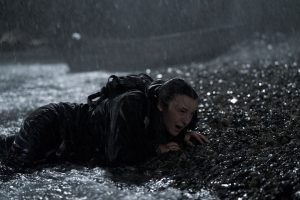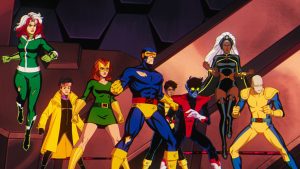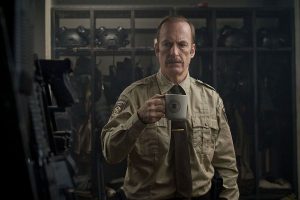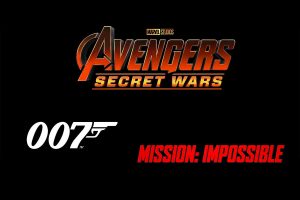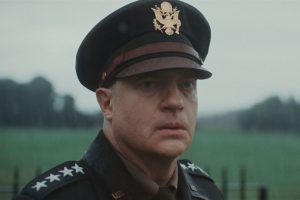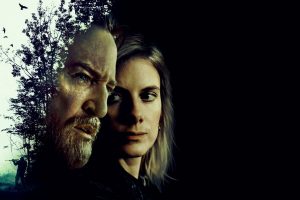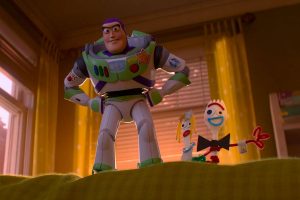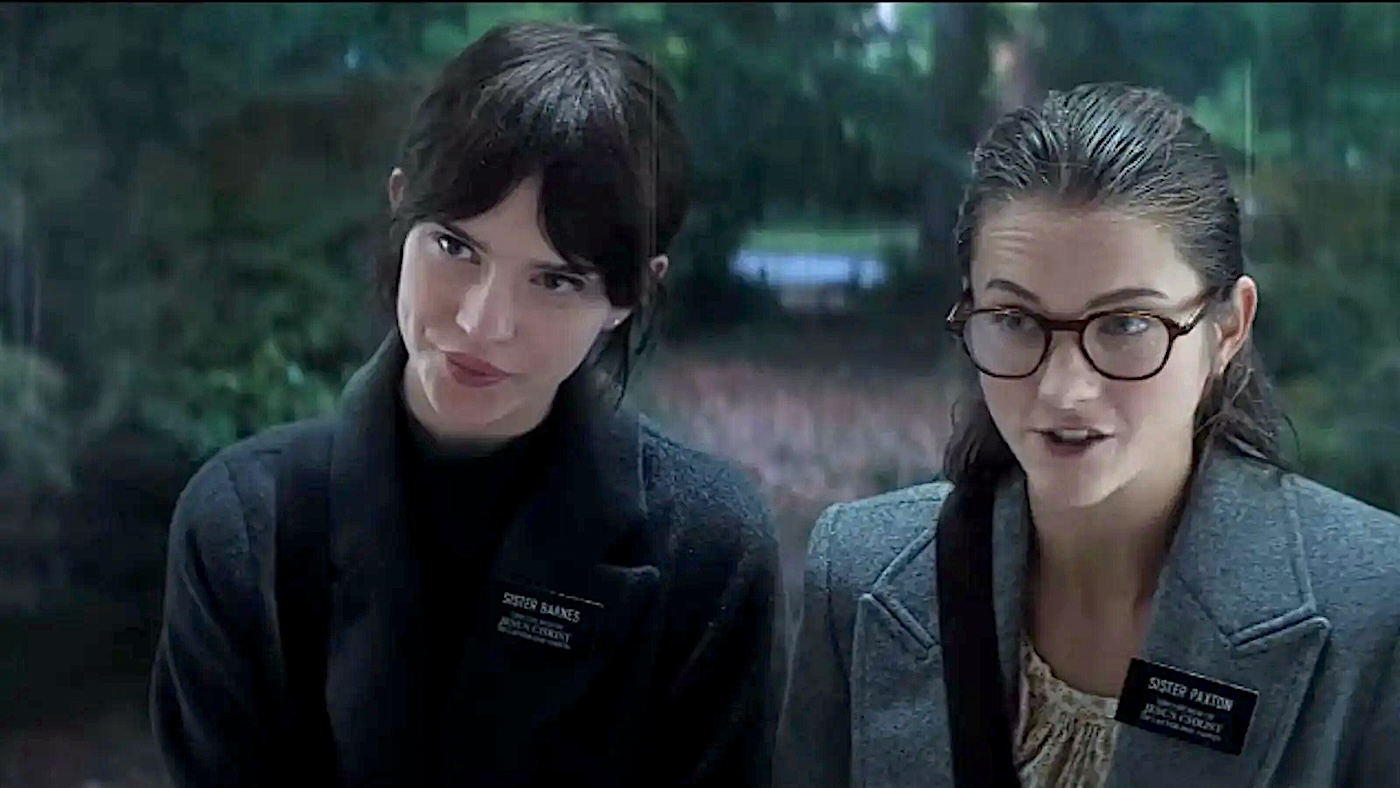
The character of Mr. Reed frightened Scott Beck and Bryan Woods years before they knew he looked like Hugh Grant. Dapper, erudite, and domineeringly cheerful in his condescension, their creation was meant to embody every suspicion, doubt, and perhaps ill thought that two lifelong friends from Iowa had about religion.
And yet, when they got down to putting pen to paper, a realization occurred: How much about religion did they really know? When Beck and Woods began writing what became Heretic 12 or so years ago, they knew what their setup would be. Two young Mormon missionaries arrive on the doorstep of an intellectual who claims he has spent a lifetime searching for “the one true religion,” and over the course of tea and small talk, he reveals an unsettling thesis that is meant to challenge how these women see the world. But back then, the filmmakers tell us on the eve of Heretic’s release, they didn’t feel like they comfortably knew enough about the history of religion and civilization to put words into Reed’s mouth.
So they put Heretic aside and moved onto other things, including writing the screenplay for the original A Quiet Place, a high-concept that was the polar opposite of Heretic’s verbal battlefields. Nonetheless, the idea never left them, especially after Woods married into the Mormon religion.
“We were starting to get our bearings with Mormon faith, which is the entry point into the film,” Beck says of the early genesis of Heretic, and how it became a project of genuine inquiry for the pair. “We had made a movie in Salt Lake City, and over the course of that, we started gathering a contingency of Mormon friends and, eventually, family members. It was fascinating to us that it’s one of the newer religions in American culture.”
The project became doubly personal, as well, after a loss in their extended family.
“There was a turning point,” Woods confides, “which was my father passed away. We’ve had blessed lives, so when I say it was a low point, I say that from a place of privilege, but it’s one of those, ‘We’re having a bad year’ and then my father passes away. And for Scott that was also like losing a father, because we’ve known each other for so long. And then you get all these anxieties of what happens when you die? Which religion is ostensibly a medicine for this?”
The more the pair internalized their grief and anxiety, the more they realized it was time to pull Heretic out of the mothballs. “Now we’re going to talk about this stuff that we have a hard time talking about, that we don’t want to talk about,” adds Woods.
There is, indeed, a lot of talking in Heretic. At times the dialogue can be playful, at others menacing, but what is most impressive is how engrossing it all remains as Grant’s Mr. Reed attempts to indoctrinate young Sister Barnes (Sophie Thatcher) and Sister Paxton (Chloe East) into his ministry of doubt—and his methods are extreme. When the film begins, Barnes and Paxton have an authentic eagerness, if perhaps also naiveté, particularly Paxton who spent her lifetime in the Church of Jesus Christ Latter Day Saints. Yet there persists an unshakable intelligence in both women, which Reed seems to react toward with equal parts interest and malice.
Perhaps one key reason that honesty comes through is, coincidentally enough, both Thatcher and East were raised in the Mormon religion.
“We would never be foolish enough to think that we’re going to find Mormon people with Mormon history,” Woods explains. “[But] as we kept auditioning Sophie and Chloe, there was a truth that we started to recognize in them.” The writer-director remembers particularly telling casting director Carmen Cuba that he thought East was really good at embodying Mormon values: “There’s a truth that this young woman is embodying that sounds exactly like a Mormon missionary, the way she talks, the tone of her voice, that kind of innate naiveté.”
For East, it seemed natural if perhaps faintly ironic. After all, she’s never gone on a Mormon mission. Instead she pursued acting, which led her to Steven Spielberg’s The Fabelmans before Heretic. Nonetheless, she muses with a smirk that Heretic counts as her first experience in proselytizing.
“I was sending photos to all my friends with my nametag,” East says about her Sister Paxton wardrobe. “And I’m like, ‘You guys didn’t think I was gonna go on a mission but here I am! It’s happening!’” It’s a bemusing twist… as well as access to years of research since so many of her friends, both men and women, have volunteered to represent the church out in the world.
But while East came to the faith after her parents converted, Thatcher’s family has deep roots in the religion, which she might have mentioned early in the casting process.
“I wanted the role so bad that I was really milking it,” Thatcher laughs. “I was like, ‘I grew up Mormon, my great uncle is actually mentioned in the script: Gordon B Hinckley.’ And I told that to the casting director, I told that to them. So I was like, ‘you have to cast me!’ I unashamedly used it.”
The opportunity seemed serendipitous to both actor too, who while reading Woods and Beck’s screenplay recognized a level of depth and texture rarely seen in Mormons appearing in pop culture. “If you know, you know,” says East.
Thatcher would agree, adding, “For my character, I showed that there can be a darker, maybe more skeptical, artistic Mormon.” She even sees her own childhood in the film. While raised in Chicago, a little further afield from family in Utah, Thatcher’s family tree reached far back. “Growing up, it was the only thing I really knew. So it was very natural. And I think there was, similar to Sister Barnes, this feeling of wanting to rebel against everybody because that’s all I’ve known.”
That hint of rebellion in Barnes is likewise what piques Mr. Reed’s interest. And after 12 years of on/off research, Beck and Woods finally saw him brought to vivid life by a smiling Hugh Grant.
“The script had been done,” Beck says while recalling when Grant entered the picture. “And just on a technical level, we [knew we needed] somebody that is approaching this almost like a stage play where they have to memorize an insane amount of dialogue and speak it with conviction.” They also needed someone who could seem utterly reasonable, even if what they’re saying is by design incendiary.
While setting up a checklist of those and other elements, the filmmakers and their A24 studio quickly came back time and again to Grant, an actor who defined disarming charm throughout most of his career, but recently had turned toward what Beck likens to a “character actor” phase filled with fiends and malcontents.
“We realized we could have the best of both worlds,” says Beck. “We could have his dark character actor roles combined with that charm that he had the world enraptured with in the 1990s and early 2000s. We could weaponize [both] in this role at once.”
It was weapons-grade charisma, too, that Thatcher and East were working opposite from. Both had grown up watching Grant’s movies, with Thatcher likening her earliest impression of him to that of a distant, European deity.
“I grew up with just this image of him being like a British king,” Thatcher explains while thinking back on Love Actually and Bridget Jones’s Diary. “He felt like royalty to me, and I grew up with my mom really liking him. So I think there was this feeling of otherworldliness to him.”
East has similar memories of Grant being a staple in her household, with Sense & Sensibility being one of her mother’s favorite movies. Yet her point of reference was a little more modern and befitting Heretic. For example, around the time she found out Grant was cast, East had just come out of seeing Dungeons & Dragons, which reinforced her image of him.
“I have realized my Hugh Grant pull is very polarizing from most people,” East admits, “but, you know, Paddington 2 is one of the best movies ever made, and he’s a villain in it. So I was like ‘he’s perfect.’” Still, watching him and collaborating with him are two different things.
“It was a lot more unsettling seeing Hugh do the scenes than how I imagined it in my head or read it,” East adds. “Hugh is such a charming guy in real life. So if anything, I’m second-guessing my early conversations with Hugh, because he was so good at being so charming and then made such a turn.”
To get to that turn, all three actors rehearsed relentlessly over countless hours with Beck and Woods.
“It would have been a shit show if we had done it without the rehearsals,” explains Thatcher, “because we got a general sense of the blocking. And I think that helps with even memorizing your dialogue—to get fully memorized it’s nice to have a visual of the room… We were able to get the words in our bodies.”
And there are a lot of words, much of it challenging, confrontational, and intended to spark a debate.
“There’s so much that you can pack into your brain about how religion has dictated civilizations over thousands of years,” Beck says, “how it dictates laws in our country; how it exerts control; how there are aspects of it that are incredibly beautiful; how there are cults that lead otherwise very grounded people into very dangerous situations.”
Ultimately though, both directors wish to leave their movie open to interpretation, with the intention being to build “a platter” where every belief system, from devout Mormonism to aggressive atheism, is on the menu. What is on trial is becoming fundamentalist about any of the above.
“You could argue that the movie is critiquing, or at the very least examining, certainty as dangerous,” Woods says. “The idea that I know what the one true religion is, and you’re wrong. Or conversely, I know that there is no religion and you’re dumb for feeling the way you feel.” Woods says this can apply to almost any field, though, from the danger of certainty in politics to even, jokingly, a certainty in film appreciation.
“I love the movie Joe Dirt with David Spade,” Woods smirks. “But if somebody came up to me and said, ‘I know that Joe Dirt is the greatest movie in the history of cinema,’ I would be terrified of that person.”
“I think this movie works because it asks a lot of terrifying questions,” Thatcher says of its appeal. Her co-star agrees, but notes how your perceptions of its answers change depending on your own background.
“I had two of my mom’s friends from growing up come to the screening, who are very devout Mormons,” East says. “And they knew me when I was in my mom’s stomach, like I’ve known them my whole life, and they got out of it and they’re like, ‘Can you believe that miracle happened [in the story]?’ And they loved the movie and were so passionate about what ended up happening.” Conversely after Heretic’s AFI Fest premiere last month, journalists came up to East with entirely more cynical and secular readings of the movie’s finale.
“Depending on how you were raised or how you watch it, you will have a different outcome,” East surmises. It’s a bit like religion in that way.
Heretic is in theaters in the U.S. on Nov. 8 and in UK cinemas now.
The post Heretic: The Horror of Mormonism, Atheism and Everything Between appeared first on Den of Geek.

